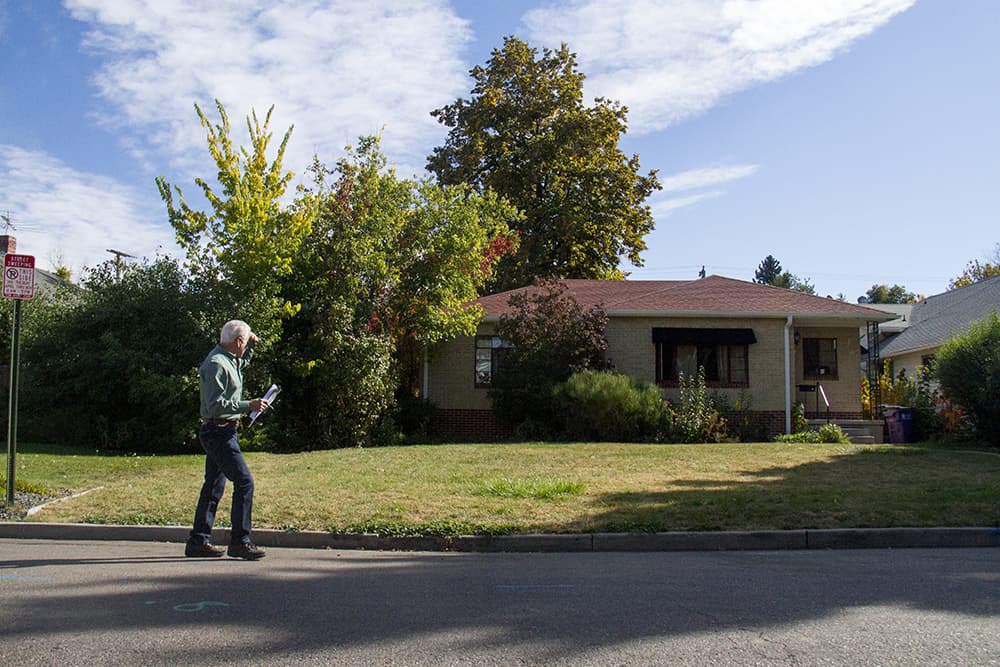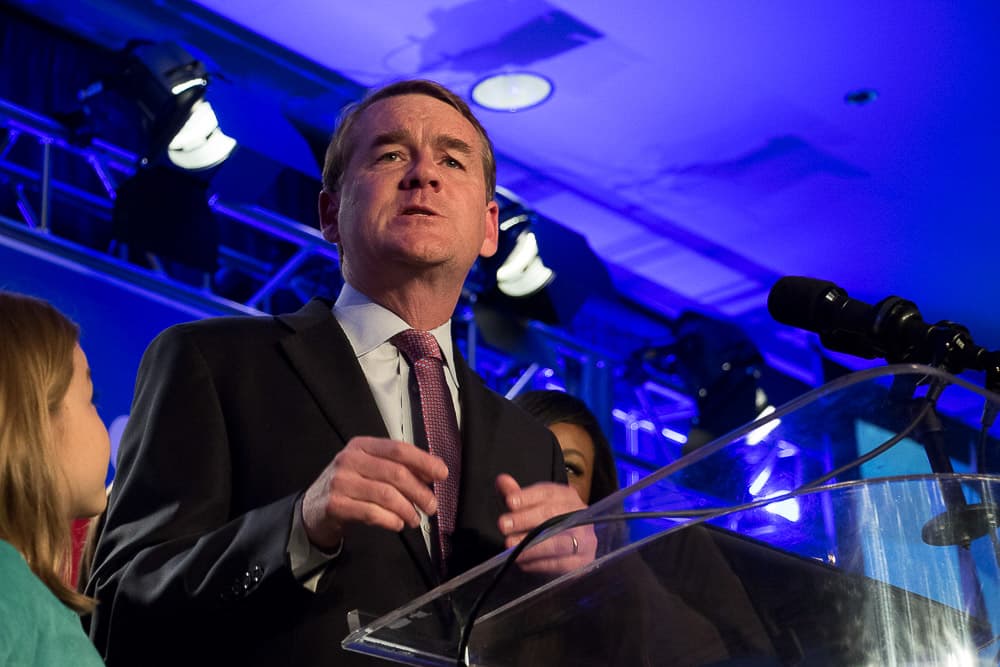Donald Trump lost Colorado, and Darryl Glenn did not win his Senate race against incumbent Democrat Michael Bennet, a seat that once appeared on national "most vulnerable" lists.
But state Republicans are feeling pretty good.

The GOP held onto control of the state Senate and the University of Colorado Board of Regents. U.S. Reps. Mike Coffman and Scott Tipton, both facing well-funded Democratic opponents who thought this might be their year, cruised to comfortable wins. Coffman handily beat his 2012 margin and Tipton crushed Gail Schwartz by 14 points.
Even Glenn's five-point loss to Bennet was much narrower than the 15 points by which the Republican polling firm Magellan Strategies had him down in mid-October.
"I come away from this election still believing this is a purple state," Republican strategist Dustin Olson said in a conference call organized by the state party to tout what went right in 2016. "We wish it were redder, but it is still purple."
Before I go any further, I need to engage in some journalistic transparency.
I wrote an article less than two months ago that suggested the Republican Party -- and particularly the party in Colorado -- was in trouble. In my defense, most of the Republicans I interviewed agreed with my basic premise, that the candidacy of Donald Trump had exposed deep fissures in the Republican coalition that needed to be reckoned with. Also in my defense, audio tapes of the now president-elect bragging about grabbing women by the (you've heard this 100 times now, so I don't need to keep saying it just to re-shock us all), and I foolishly thought that might not bode well for his candidacy.
And it wasn't just me. The Atlantic called Colorado the swing state "that fell off the electoral map," and the Washington Post contrasted the Clinton and Trump get-out-the-vote efforts in Colorado on the eve of the election in a way that didn't make the Republicans look particularly with it.
But Ian Lindemann, Colorado state director for the Republican National Committee, described an outreach effort that was both broader and deeper than the Trump campaign alone. It involved establishing a year-round field presence and building up a local volunteer base that had people talking to their own neighbors about voting Republican. Republicans focused on boosting turnout in rural counties, Lindemann said, to counter Democratic Denver and Boulder, and they used the mail ballot system to their advantage.

Did it work? The Magic 8 Ball says, "Reply hazy. Try again."
David Flaherty of Magellan Strategies said he doesn't want to be a "Debbie downer" to state Republicans -- holding the state Senate in a presidential year was "an amazing feat" -- but any real understanding of what happened in 2016 is months away, after analysts comb through precinct-level data to better understand which voters showed up and what they did at the polls. It's not clear yet, Flaherty said, how much the election results reflect long-term changes in the electorate as opposed to the strengths and weaknesses of individual candidates and their campaign strategies.
And what does it mean that Darryl Glenn managed to lose by "only" five points when now-Rep. Ken Buck, who ran against Bennet in 2010, lost by just two points?
"Does it mean voters wanted to hear that message?" Flaherty asked, in a tone that suggested the answer is "probably not."
(That message, in case the election feels like ancient history already, was that Glenn was an unapologetic Christian conservative who would stand on principle rather than compromise.)
And if we're looking for trends, what do we make of Democrat Rebecca McClellan squeaking out a win for State Board of Education, giving Democrats control of that body for the first time in 50 years, in the same congressional district that re-elected Coffman by eight points?
Some of the Republican confidence came from early vote returns that made the presidential race appear closer -- just two or three points -- than many Colorado polls had shown in the weeks before the election. But in the home stretch, the polling was all over the place, and now that more ballots from places like Denver and Boulder have been counted, it's looking like Clinton won the state by five points, the same margin as Barack Obama over Mitt Romney in 2012.
At the same time, there's the question of whether third-party candidate Gary Johnson helped Clinton secure her Colorado victory.
This changing narrative of what even happened -- much less why -- is playing out at the national level as well. At first it was a low turnout election, and then it actually wasn't. Latino Decisions raised major questions about exit polling that seemed to show surprisingly high Latino support for Trump -- questions like, "How are you defining Latino?"
In fact, data is still coming out that will provide political nerds with plenty of "Well, actually" material for future debates.
Pueblo is the real prize here.
Earlier this fall, the Denver Post's John Frank identified Pueblo as an opportunity and a test for Trump, a heavily Latino part of the state with a substantial Democratic registration advantage that has a lot in common with the Rust Belt cities of the Midwest. With all the ballots counted, Pueblo went for Trump by 390 votes, a difference of 0.5 percent.
Pueblo County Democratic Chair Mary Beth Corsentino told me a story: the Democrats had a booth at the Colorado State Fair with a cardboard cutout of Hillary Clinton, and one day, a woman walked up and punched the cutout in the face.
"I guess I should have picked up on that earlier, that people just didn't like her," Corsentino said. "I don't know why people didn't like her. I liked her."
But it wasn't just personal dislike of Clinton that cost her votes in Pueblo. Corsentino said the many Clinton volunteers who came in from out of state worked really hard, but they didn't have the flexibility to work with the local political culture. They could work the sidelines of local parades, registering voters, but they couldn't march in the parade with local Democrats or wave signs at high school football games.
"They couldn't participate because 'visibility' wasn't part of their strategy at that point," Corsentino said. "It was very top-down, directed. It didn't account for the sort of chile festival things we have here."
Chris Hansen, who recently stepped down as Sen. Cory Gardner's chief of staff to run the National Republican Senatorial Committee (which Gardner now chairs), said this change has been coming for several years. Gardner lost Pueblo County in 2014, but barely.
And of course, state Sen. Angela Giron was recalled and replaced in 2013 by Republican George Rivera, in large part over her gun control votes.
Is this actually a new phenomenon? In a letter to the editor Corsentino posted on her Facebook page, she noted that liberal Democrats have always struggled in Pueblo, and the county has voted for Republicans for local and state offices. "Yes, our registration numbers are higher, but our voters tend to be selective."
Republicans hope, though, that a more enduring shift is underway than a few county offices and state leg seats.
"The Democrat Party in Colorado is controlled by Denver and Boulder liberals," Hansen said. "That's not a talking point. That's just a fact. They don't understand the rest of the state. There is a big difference between a Boulder Democrat and a Pueblo Democrat."
State Republican Chairman Steve House said those differences give Republicans a base to build on to try to win back the governorship in 2018. Pueblo, he said, "holds the key."
"It starts with the concept that having the presidency, the House and the Senate, we really will see job growth, especially in energy," House said. "We'll keep spending time there, but in reality we're going to govern well."
For his part, Flaherty agrees that what Republicans do with the next two years will be key.
"One big thing that is undeniable -- before people get ahead of themselves -- is that we're going to have to defend everything," he said. "We own everything. The 2017 legislative cycle is going to set the table for all Republicans."
Democrats aren't giving up on Pueblo or the governorship.
State Rep. Joe Salazar, an ardent Bernie Sanders supporter who represents the Thornton area and who has family in Pueblo, said the Republican argument that Democrats haven't been good for jobs or the economy is "a lie." Colorado is booming. The trick is making sure the benefits reach everyone. He doesn't think Democrats need to compromise core principles to do that.
"I would challenge any Republican to say how our social policy issues aren't working with our economic policy issues," he said. "We don't compromise on humanity. That's my position as an elected official. We don't put profits over people."
Salazar, who has hinted he might run for governor, said jobs and environmental protections aren't in conflict either.
"We need to move stronger and harder on industries that are good for business and that create jobs and are good for the environment," he said. "We need to stop catering to oil and gas and create jobs in renewables. We need to create a hemp industry. Is that progressive? Sure. Does it create jobs? You betcha."
Corsentino, the Pueblo Democratic Chair, said she still sees the 2016 results in Pueblo as a one-off. What happens in 2018 will depend a lot on the candidates. She thinks Ken Salazar -- the former senator and former Secretary of Interior under Obama, a moderate Democrat with deep family roots in southern Colorado -- would do very well in Pueblo County.
In fact, Bennet, the incumbent Democrat, did well in Pueblo County in his Senate race.
"If (Republicans) think they're going to make inroads in 2018, we'll just have to see," she said.

But JoyAnn Ruscha, a Democratic consultant and Sanders supporter, said Democrats need to take a hard look at 2016. Clinton's five percent win in Colorado somewhat obscures the fact that being a Democrat seemed to be a liability this year -- and it wasn't Clinton's fault. It's a party-wide problem, she said.
"If you were to take a poll of Democrats and ask them what Democrats believe in, half of them would start complaining about the Democrats they vote for," she said. "Some of that criticism is fair, and some of it just comes with the territory of having control of the White House for eight years.
"But we Democrats have been running the same campaign, year after year, with the same tired message: 'The other candidate is very mean and kind of stupid, so vote for me.'"
The lesson of 2016, she said, is that that won't cut it anymore. Instead of holding up positive jobs reports or pointing to insurance access, Democrats need to address wage stagnation and rising premiums. More critically, they need to make people feel seen and heard by their politicians.
Guns have been a wedge issue for Pueblo Democrats, but Corsentino thinks jobs are a much greater concern.
"People would like to not send their kids somewhere else to work," she said. "We're a family community, and we would like to have the jobs here."











